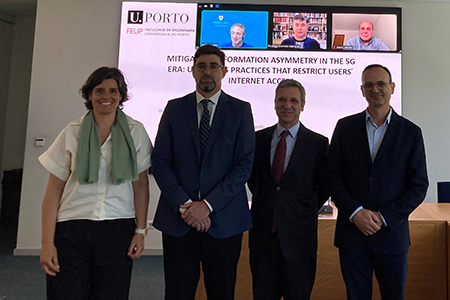Candidate
Hermann Bergmann Garcia e Silva
Date, Time and Location
June 18, 10:30, Sala de Atos FEUP
President of the Jury
António Fernando Vasconcelos Cunha Castro Coelho, PhD, Associate Professor with Habilitation, Departamento de Engenharia Informática, Faculdade de Engenharia, Universidade do Porto.
Members
Rodrigo Moreno Marques, PhD, Adjunct Professor, Departamento de Teoria e Gestão da Informação, Escola de Ciência da Informação, Universidade Federal de Minas Gerais, Brasil;
Paulo Alexandre Ferreira Simões, PhD, Associate Professor, Departamento de Engenharia Informática, Faculdade de Ciências e Tecnologia, Universidade de Coimbra;
António Manuel Raminhos Cordeiro Grilo, PhD, Associate Professor, Departamento de Engenharia Eletrotécnica e de Computadores, Instituto Superior Técnico, Universidade de Lisboa;
Ana Cristina Costa Aguiar, PhD, Associate Professor with Habilitation, Departamento de Engenharia Eletrotécnica e de Computadores, Faculdade de Engenharia, Universidade do Porto;
Manuel Alberto Pereira Ricardo, PhD, Full Professor, Departamento de Engenharia Eletrotécnica e de Computadores, Faculdade de Engenharia, Universidade do Porto (Supervisor).
Abstract
Since John Barlow’s declaration of cyberspace independence over two decades ago, many transformations have unfolded in the digital ecosystem. The utopian vision of free space has given way to a reality where information flows are shaped by the Internet architecture, its communication protocols, and the intervention of network operators, which influence the behavior and autonomy of users.
Nowadays, the fifth generation of mobile communications systems (5G) materializes a programmable network that provides the flexibility and scalability required to handle the exponential growth of data traffic and the heterogeneity of use cases. Central to the 5G technology, network slicing introduces new traffic differentiation paradigms that segment users, applications, and services into customized logical domains with dedicated radio and computational resources.
This 5G feature potentially conflicts with the net neutrality principle, which seeks to ensure that Internet communications are treated in the same manner, without discrimination. In this context, it has become an issue of public interest to assess traffic differentiation mechanisms implemented by Internet service providers (ISPs) that could interfere with the flow of information and the freedom of choice in the virtual locus.
Thus, this study aims to characterize the practices employed by ISPs that discriminate Internet traffic, examine the regulations established to discipline these practices, discuss the net neutrality principle, and analyze the contradictory nature of network slicing and net neutrality. The first contribution of this thesis involves the portrayal of ISPs’ practices that restrict users’ Internet access to applications, services, and legal content. The second contribution showcases a comparative analysis of the regulations implemented to discipline these practices. The third contribution presents an innovative application of the standardized Network Data Analytics Function (NWDAF), designed to enable the evaluation of Internet Traffic Management Practices (ITMPs) through the controlled exposure of information to regulatory authorities. Via the NWDAF, regulators obtain direct and automated access to performance metrics in 5G networks.
As the methodological pathway, this study adopted an interdisciplinary approach, combining three dimensions of analysis: informational, technical, and legal. The results obtained show a divergence in regulating the zero-rating practice, indicate that net neutrality can be evaluated from an intra-slice perspective in 5G networks, and demonstrate the NWDAF’s ability to extract key performance indicators (KPIs). The NWDAF may be a relevant tool for improving network transparency and supporting regulatory oversight, which are indispensable elements to guarantee the coexistence of network slicing and net neutrality.
Keywords: Internet governance; Information policy; Net neutrality; 5G; Network slicing.
